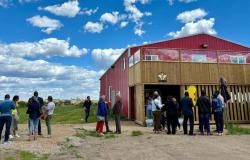With 80,000 more housing units planned by 2040 in Quebec City, Mayor Marchand is hopeful of curbing the housing crisis, but he warns citizens that there will be construction everywhere in the city, from Cap-Rouge to Beauport.
• Read also: Quebec City: new financial incentives for social housing
• Read also: Housing crisis sends rent prices soaring ahead of March 1is July
“Quebec will not become a city of condo towers in the neighborhoods. It will remain a city of quality of life,” assures Bruno Marchand, in an interview given to Journal“We are not in the process of becoming Montrealers and we do not want to demolish the neighborhoods,” he adds.
But there will be construction, in all sectors, he announced. “We are telling the people of Quebec that we are going to solve what they consider to be the most important problem. It will take us months, years. We are going to solve this problem, because it is about the vitality of Quebec, the ability to look after people’s children, to allow seniors to stay in their neighbourhoods.”
Not in my yard
The plan to build 80,000 housing units by 2040 responds to a need widely expressed by citizens. “Almost everyone in Quebec City tells us that we need to build housing, that it’s urgent, but not on my street, not in my neighbourhood, not in the woods, not in wetlands.”
Recently, projects to build social and affordable housing in residential areas have sparked a wave of protest in the neighbourhood. Rue de l’Hôpital in Loretteville and Rue Antonin-Marquis in Duberger, for example.
“We cannot resolve the crisis if we do not build anything,” summarizes Mr. Marchand, who speaks of “gentle” and “respectful” densification.
Everywhere in town
“It will be everywhere in the city,” adds Marie-Pierre Boucher, a councillor and member of the executive branch responsible for housing. With a 0.9% vacancy rate, while the equilibrium threshold is 3%, “there are needs everywhere in the territory.” We will choose the right project in the right place, explain the two elected officials. The tallest buildings will not appear in neighborhoods of bungalowsThey will be concentrated along the main routes, including public transport routes such as the tramway.
Benoit Longchamps, director of the Living Environments Division at the City of Quebec, points out that the densification of neighbourhoods brings gains in economic vitality. New businesses are setting up shop, and this, for the benefit of all citizens. For Mr. Marchand, the example of Quatre-Bourgeois illustrates this well. We feared congestion with the arrival of apartment buildings at the corner of Robert-Bourassa. This did not happen, he says, and citizens now have access to a grocery store. It can also be a park, a daycare, a clinic or a pharmacy.
Cheaper taxes
Densification “facilitates the management of public finances,” says Mr. Longchamps, because it optimizes facilities. On the other hand, “if the city does not grow, it will cost more in taxes,” summarizes the mayor. “A densified neighborhood costs the City less because the services are shared by a greater number of people. On the tax bill, it has a positive contribution.”
Citation
“We have a beautiful city that will remain so, an extraordinary city on a medium scale. It will not become Montreal. […] We are just telling people: ‘You told us that the main problem is housing. You are right, and we are looking for solutions with you.'”
— Bruno Marchand, Mayor of Quebec
Quebec City is easing the regulations of its Urban Planning Commission to speed up the issuance of permits and the construction of new housing.
On June 12, the executive committee adopted an amendment to its by-law on the Commission d’urbanisme et de conservation de Québec (CUCQ). The aim is to lighten the Commission’s workload in order to reduce the time it takes to obtain permits. To do this, the choice has been made to limit the renovation work that is subject to it, in certain sectors of the City. From now on, in seven sectors, accessory work that does not affect the heritage value will no longer have to be authorized by the CUCQ. Examples include a staircase or a rear gallery, a secondary building or elements that are not very visible from the street.
These reductions do not apply to areas of high historical value such as the four heritage sites in the city.
More agility
“We want the CUCQ to focus on elements that are important for the preservation of heritage,” assures Mélissa Coulombe-Leduc, councillor and member of the executive and responsible for Heritage. For Mylène Gauthier, director of the land planning division at the City of Quebec, we want to give ourselves “more fluidity and agility.”
In 2023, for the sectors affected by the reductions, the CUCQ received 1,262 permit applications. According to the City’s estimates, with the new regulations, 15% of these applications will not have to be considered by the CUCQ, the councillor emphasizes.
Time saving
This is a “gain in efficiency and time” which will therefore speed up the issuing of building permits more quickly for new housing units, according to her.
In addition, if the City chooses to use the new powers granted to it by the government to accelerate the construction of a project, it will no longer have to obtain the Commission’s approval, except in the four heritage sites.
This is a “first turn of the wheel,” says M.me Coulombe-Leduc, and the Marchand administration want to “go deeper” this fall to further speed up the issuing of permits.
Do you have any information to share with us about this story?
Write to us at or call us directly at 1-800-63SCOOP.






